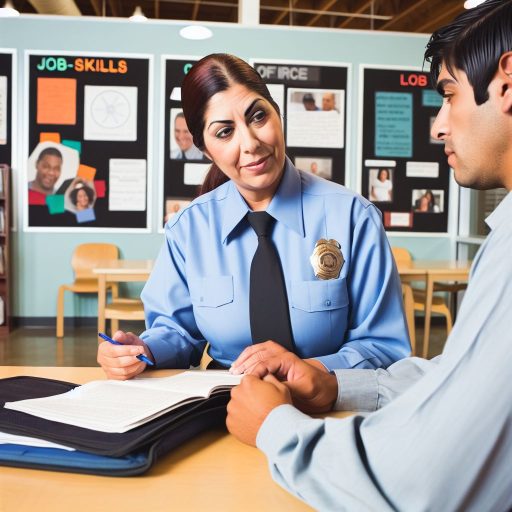Introduction:
The role of counterterrorism specialists is crucial in combating terrorist threats globally.
Understanding historical perspectives on terrorism helps in developing effective strategies.
Historical Evolution of Terrorism:
Understanding the origins of terrorism is essential for counterterrorism specialists.
Terrorism dates back to ancient times, with acts of violence aimed at instilling fear.
Throughout history, terrorism has evolved and adapted to changing political and social climates.
Key Events in History:
- The French Revolution saw the rise of state-sponsored terrorism and guillotine executions.
- The anarchist movements of the late 19th century introduced the concept of political terrorism.
- The 20th century witnessed the emergence of terrorist groups like the IRA, ETA, and Red Army Faction.
Shaping Modern Terrorism:
- The 9/11 attacks on the World Trade Center marked a turning point in global terrorism.
- The spread of extremist ideologies through social media has fueled the rise of lone-wolf attacks.
- Technological advancements have enabled terrorists to coordinate and carry out large-scale attacks.
The Importance of Historical Context:
Counterterrorism specialists must analyze past terrorist movements to anticipate future threats.
Understanding the root causes of terrorism helps in developing effective counterterrorism strategies.
Historical knowledge allows specialists to identify patterns and prevent potential terrorist actions.
Define the Role of Counterterrorism Specialists
Counterterrorism specialists are responsible for analyzing intelligence to identify potential threats.
They work closely with law enforcement agencies and intelligence services to gather information.
These specialists develop strategies to counter terrorist activities and mitigate risks.
Skills and Training Required
Counterterrorism specialists need to have a strong analytical mindset and critical thinking skills.
They must possess knowledge of terrorist organizations, tactics, and ideologies.
Training in surveillance, crisis management, and conflict resolution is also essential.
Challenges and Responsibilities
Counterterrorism specialists face the challenge of staying ahead of evolving terrorist threats.
They have the responsibility to protect civilians and uphold national security.
These specialists must work under intense pressure and make split-second decisions.
Counterterrorism specialists play a vital role in safeguarding society from terrorist threats.
Their skills, training, and dedication are instrumental in maintaining peace and security.
Find Out More: Role of Sheriffs in Inmate Transport
Transform Your Career Today
Unlock a personalized career strategy that drives real results. Get tailored advice and a roadmap designed just for you.
Start NowImportance of Intelligence Gathering
One of the key strategies used by counterterrorism specialists is intelligence gathering.
This involves collecting information on potential threats, terrorist organizations, and their activities.
Intelligence analysis is crucial in determining the credibility and severity of a threat, allowing specialists to prioritize their response efforts.
Coordination in Counterterrorism Efforts
Another critical aspect is coordination among different agencies and international partners.
Collaboration and sharing of intelligence enhance the effectiveness of counterterrorism operations.
Sharing information and resources across agencies and borders help in identifying and tracking terrorists, disrupting their operations, and preventing future attacks.
Strategies Used in Prevention and Response
Counterterrorism specialists employ a mix of defensive and offensive strategies.
Defensive measures include securing potential targets, critical infrastructure, and enhancing border security.
Offensive tactics involve targeted operations to dismantle terrorist networks, disrupt their funding sources, and eliminate key leaders.
Special forces and intelligence agencies play a vital role in these operations.
Successful Examples of Counterterrorism Operations
There have been several successful examples of counterterrorism operations in recent history.
One notable example is the operation that led to the death of Osama bin Laden, the mastermind behind the 9/11 attacks.
The coordinated effort between US intelligence agencies and special forces resulted in locating and eliminating bin Laden, dealing a significant blow to the al-Qaeda network.
Another successful operation was the capture of ISIS leader Abu Bakr al-Baghdadi by US special forces.
This operation demonstrated the importance of actionable intelligence and precision in executing counterterrorism missions.
These examples highlight the importance of intelligence, coordination, and effective use of strategies and tactics in combating terrorism.
Counterterrorism specialists continue to adapt and evolve their approach to stay ahead of evolving threats.
Discover More: How ICE Agents Collaborate with Other Law Enforcement
Case Studies:
- Analyze historical case studies in which counterterrorism specialists played a crucial role in preventing or responding to terrorist attacks.
- Explore the lessons learned from these case studies and their relevance to modern counterterrorism efforts.
- Highlight the effectiveness of counterterrorism specialists in different contexts.
Counterterrorism specialists have been instrumental in preventing and responding to terrorist attacks throughout history.
By examining specific case studies, we can gain valuable insights into the role of these experts and the impact of their actions.
Transform Your Career Today
Unlock a personalized career strategy that drives real results. Get tailored advice and a roadmap designed just for you.
Start NowAnalyze Historical Case Studies:
One significant case study is the 1972 Munich Olympics massacre, where Palestinian terrorists killed 11 Israeli athletes.
The German security forces’ failure highlighted the need for specialized counterterrorism units.
In response to the Munich tragedy, countries began to develop elite counterterrorism units, such as the British SAS and the US Delta Force.
These specialized teams underwent rigorous training to confront terrorist threats effectively.
Explore Lessons Learned:
The lessons learned from the Munich Olympics attack emphasized the importance of intelligence gathering and rapid response capabilities.
This incident underscored the need for coordination among different security agencies to combat terrorism effectively.
Another critical case study is the 9/11 terrorist attacks in the United States.
This tragic event revealed gaps in intelligence sharing and coordination, leading to the creation of the Department of Homeland Security and the establishment of the CIA’s Counterterrorism Center.
Highlight Effectiveness in Different Contexts:
Counterterrorism specialists have demonstrated their effectiveness in various contexts, including hostage rescue operations, counterinsurgency efforts, and cyber warfare.
These experts use their skills to neutralize terrorist threats and protect national security.
In recent years, counterterrorism specialists have played a vital role in disrupting extremist networks and preventing attacks in countries around the world.
Their expertise in analyzing threats and implementing strategic responses has been crucial in safeguarding communities from terrorist violence.
See Related Content: Emergency Management Director: Case Studies and Lessons Learned

Ethical Considerations:
When it comes to counterterrorism specialists, ethical dilemmas are a constant concern in their line of work.
These professionals often face difficult decisions that test their morals and values.
- Discussing the ethical dilemmas faced by counterterrorism specialists is crucial to understanding the complexities of their job.
- One of the main dilemmas revolves around the balance between security concerns and individual rights. How much privacy should be sacrificed for the greater good?
- Counterterrorism specialists must constantly navigate through this delicate balance to ensure both security and protection of civil liberties.
It is essential to emphasize the importance of upholding ethical standards in all counterterrorism operations.
Without ethical guidelines, there is a risk of abuse of power and violation of basic human rights.
- By maintaining ethical standards, counterterrorism specialists can gain the trust and support of the public.
- Transparency and accountability in their actions are crucial to maintaining ethical integrity in their line of work.
- Counterterrorism specialists must be held to the highest ethical standards to prevent any form of misconduct or corruption.
Ethical considerations play a significant role in the work of counterterrorism specialists.
Upholding moral values and ethical standards not only ensures the effectiveness of their operations but also protects the rights and freedoms of individuals.
Delve into the Subject: Parole Officer Success Stories
Transform Your Career Today
Unlock a personalized career strategy that drives real results. Get tailored advice and a roadmap designed just for you.
Start NowCollaboration and Communication:
Collaboration and communication play a crucial role in counterterrorism efforts.
It is essential for different agencies and countries to work together effectively to combat the threat of terrorism.
Importance of Collaboration and Communication:
- Sharing of intelligence and information between agencies and countries is vital in identifying and preventing terrorist activities.
- Collaboration allows for a coordinated response to terrorist threats, leading to more efficient and effective operations.
- Working together enhances the overall capabilities and resources available for counterterrorism efforts.
- Building trust and relationships through collaboration can facilitate smoother operations and mutual support in times of crisis.
- Combining expertise and knowledge from various sources can lead to innovative strategies for countering terrorism.
Challenges of Sharing Information and Coordinating Operations Across Borders:
- Differing legal frameworks and regulations can hinder the sharing of sensitive information between agencies and countries.
- Cultural and language barriers may impede effective communication and collaboration efforts.
- Potential security risks and concerns about the protection of classified information can create obstacles to information sharing.
- Lack of trust and reluctance to share information due to concerns about sovereignty and political sensitivities.
- Operational differences and varying priorities among agencies and countries can complicate coordination efforts.
Ways to Improve Communication and Collaboration in the Fight Against Terrorism:
- Establishing formal agreements and protocols for sharing information and intelligence between agencies and countries.
- Conducting joint training exercises and simulations to enhance coordination and interoperability among different agencies.
- Utilizing technology and secure communication platforms to facilitate real-time information sharing and collaboration.
- Promoting cultural exchange programs and language training to improve cross-border communication and understanding.
- Creating joint task forces and working groups focused on specific counterterrorism objectives to streamline collaboration and decision-making processes.
Enhancing collaboration and communication among different agencies and countries is essential for effectively combating terrorism.
By overcoming challenges and implementing strategies to improve coordination, the global community can strengthen its collective response to the threat of terrorism.
Counterterrorism Specialists and Their Importance
Counterterrorism specialists play a crucial role in understanding and combating terrorism.
These specialists must have a deep understanding of historical perspectives on terrorism.
Further research and discussions on this topic are necessary to enhance our understanding and approach towards countering terrorism.
Additional Resources
Counter Terrorism Policing | Home
[E-Books for Sale]
The Big Book of 500 High-Paying Jobs in America: Unlock Your Earning Potential
$19.99 • 500 High-Paying Jobs • 330 pages
Explore 500 high-paying jobs in America and learn how to boost your career, earn more, and achieve success!
See All 500 High-Paying Jobs of this E-Book
1001 Professions Without a Degree: High-Paying American Jobs You Can Start Now
$19.99 • 1001 Professions Without a Degree • 174 pages
Discover 1001 high-paying jobs without a degree! Unlock career tips, skills, and success strategies for just $19.99!




